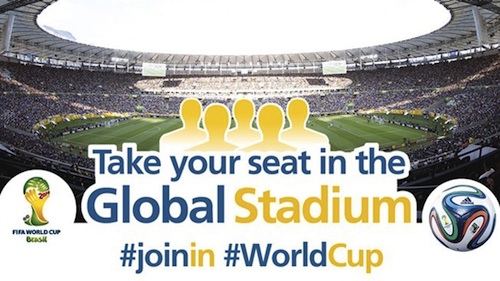FIFA is definitely going big-time on social media for the 2014 World Cup, and it appears that brands might be as well. Here’s a quote via Mashable:
“Connecting with fans posting through social is a critical opportunity for advertisers, who can engage with these viewers and potentially capture the the momentum of Twitter TV activity around games to amplify brand messages,” Stephen Master, senior vice president of sport at Nielsen, said in an email.
Indeed, and while “brand amplification” is important, it’s still likely most of the money around the World Cup will be in television. That’s partially because the social stats related to the World Cup aren’t that overwhelming — only a quarter (25 percent) of 18-to-24 year-olds plan to post on social media during the games; you might think that number would be higher. 54 percent of people plan to support a brand sponsoring one of their favorite players. These are good numbers, but not massive. Remember: no matter what you hear, Americans don’t actually love soccer deeply right now.
Remember, though: in 2010 social was relevant, but it’s evolved even more now. This could be the most social event in world history, which is awesome — but the global spend on television advertising might exceed $2.3 billion. It’s very unlikely that social would be in the same ballpark.
Rather, the hashtag could undergo a real renaissance here. There are the standard ones — such as #WorldCup and #JoinIn — and then there’s stuff like #PowerToYourMouth, which seems to be off to a good start —
Listerine's World Cup Newsroom Will Turn Social Posts Into Ads #PowertoyourMouth http://t.co/5RH15A3uTF
— Chelsea Bradley (@ChelseaRhane) June 9, 2014
Or maybe not:
So much for integrating social -no hashtag/twitter handle on @listerineglobal #PowerToYourMouth #worldcup commercial http://t.co/Rm8kN74wW3
— Tiffany Thompson (@sassyTinATL) June 9, 2014
Then there’s #TravelVictories:
Time to focus on Nigeria! Last game for the #USMNT before we head to Brazil to pick up some more #TravelVictories @MarriottIntl
— Omar Gonzalez (@Omar4Gonzalez) June 7, 2014
And #PassTheLove:
We're excited to help #passthelove of soccer with the final 23 @ussoccer stars who will be representing team USA in Brazil!
— RITZ Crackers (@Ritzcrackers) June 9, 2014
I’m not sure people will remember the branded campaigns when they’re tweeting about the matches, so the brand amplification there might be a challenge. This will be interesting to watch, though: the World Cup is such a big thing that it’s probably hard for a lot of companies to remember they need to integrate social because of a focus on the enormity of the TV buys. It could be the most social event in world history — think about that for a second — but we could emerge from it discussing primarily the resonance of the TV side, not the growth of social via the World Cup, because of silo’ed marketing efforts.
Do you think this could be a true turning point for social as a revenue channel?
